Are you dreaming of a trip to Cape Town, are you in the middle of planning, and are looking for helpful tips for your stay? Perhaps you still have a lot of questions in mind, such as:
Do I need a visa to enter South Africa?
When is the best time to travel to Cape Town?
♀️ How safe is Cape Town for tourists?
Do I need special vaccinations before my trip?
Is a local SIM card worth it for Cape Town?
How much does a vacation in Cape Town cost?
Don’t worry – you’ve come to the right place! After numerous visits to Cape Town, we have compiled our best Cape Town tips and experiences for you. If you still have questions, just leave us a comment – we’ll be happy to help. Have fun discovering and planning your trip to Cape Town!
- Why Cape Town?
- General information about the Mother City
- Travel guide for Cape Town
- Best time to visit Cape Town
- Time difference
- Duration of your stay
- Entry & Visa for South Africa
- Health & Vaccinations for Cape Town
- Book cheap flights to South Africa
- Airport transfer in Cape Town
- Districts in Cape Town
- Hotel tips for Cape Town
- Book a rental car
- Drive on the left
- Police checks
- Internet & SIM card
- Money & Currency
- Tips
- Loadshedding & Power adapter
- Safety in Cape Town
- Travel insurance
- Cape Town’s attractions
- Cape Town’s most beautiful beaches
- Activities & excursions in Cape Town
- Great restaurants in Cape Town
- Cool markets in Cape Town
- Travel budget & costs
- Packing list for South Africa
- Recommended apps & tools
- FAQs about Cape Town
Why Cape Town?
For us, Cape Town is one of the most exciting cities in the world – and not without reason! We’ve been there several times and rave about it every time. The mix of beautiful nature, vibrant culture, diverse wildlife, and a relaxed lifestyle makes this city truly unique.
Imagine: You start your day with a hike up Table Mountain and enjoy the incredible panorama, relax at lunch on the beaches of Camps Bay or Clifton, and end the evening with a glass of South African wine while watching the sunset. Sounds fantastic, doesn’t it? It is!
But Cape Town is more than that: There are beaches that are among the most beautiful in the world, and animal lovers will also get their money’s worth here: African penguins at Boulders Beach, whale watching along the Garden Route, or a day trip to the nearby Cape Peninsula, where you can see wild monkeys and antelopes.
And adventure and variety are also very important in Cape Town: Whether you’re looking for adventure, like paragliding from Signal Hill or a helicopter flight over the city, want to relax at a winery, or stroll through the markets of the Old Biscuit Mill – Cape Town truly has something for everyone.
For us, one thing is clear: Cape Town is that very special place that you can visit again and again without ever getting bored. The diversity and atmosphere of the Mother City are simply incomparable! That probably also explains why we never tire of Cape Town and South Africa in general.
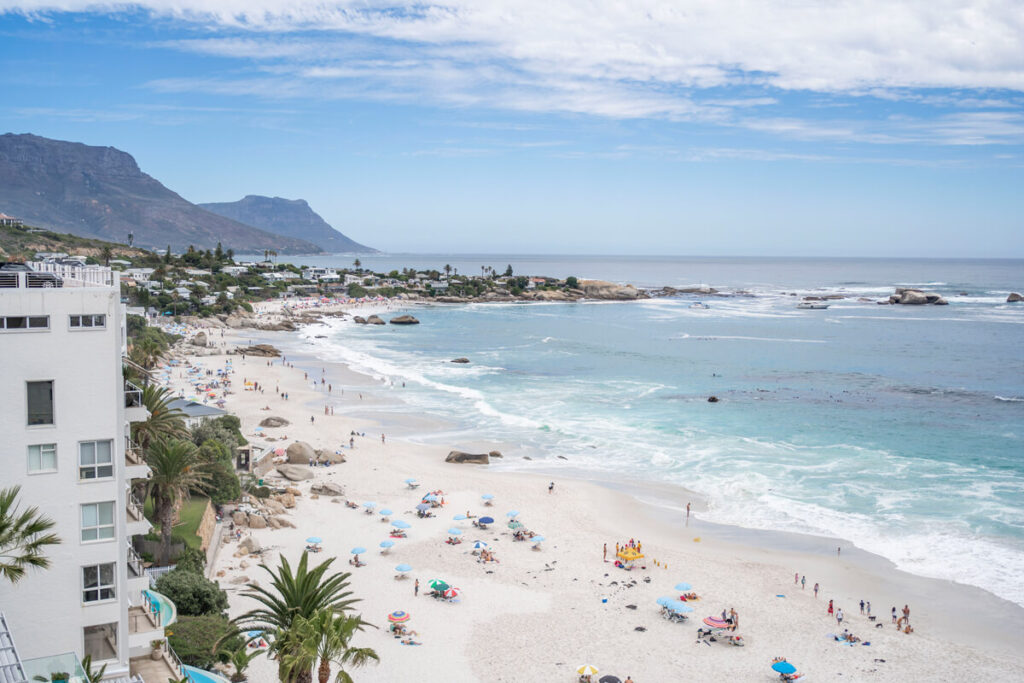
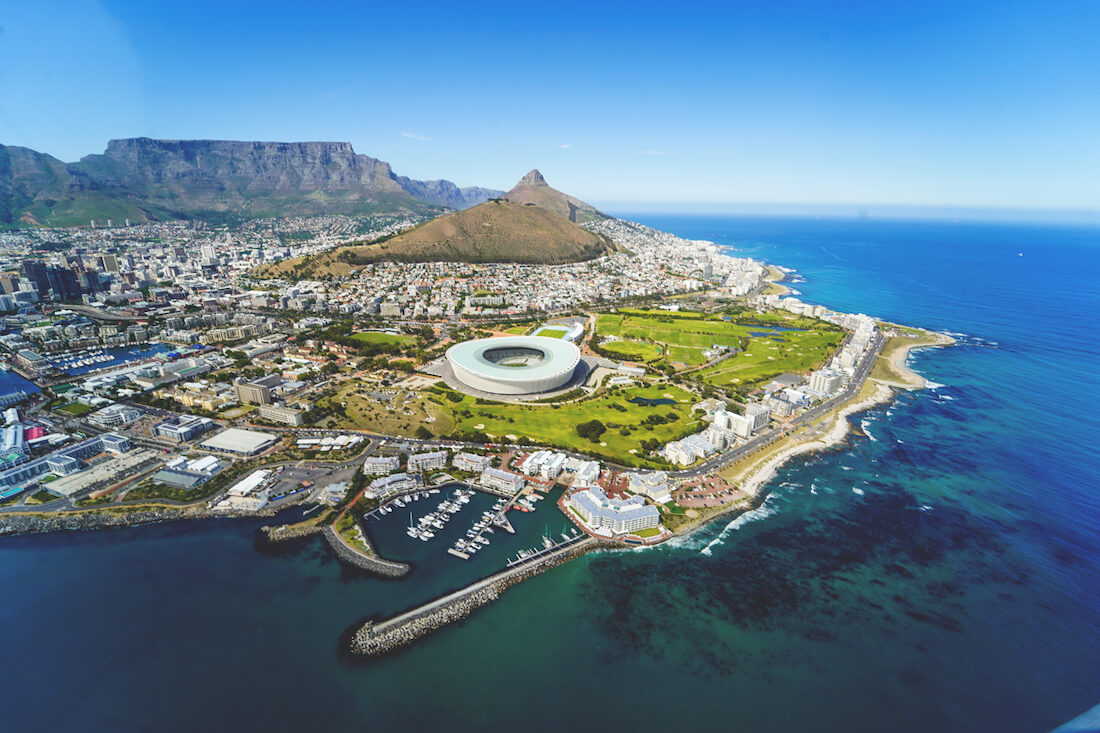

General information about the Mother City
- Founded: 1652 as a supply station for Dutch ships. East India Company
- Population: approx. 4.8 million inhabitants (including metropolitan area)
- Size: 2,446 km², second largest city in South Africa
- Time zone: South Africa Standard Time (SAST), CET +1 hour
- Languages: English (67.7%), Afrikaans (22.5%), isiXhosa (4.7%)
- Religions: Christianity (75–80%), Islam (10%), Judaism (1–2%), Hinduism (1%)
- Currency: South African Rand (ZAR)
- Airport: Cape Town International (CPT), modern and one of the largest in Africa
Travel Guide for Cape Town
We’re big fans of travel guides and, despite the many digital options—blogs, Google Maps, Instagram, Pinterest, and the like—we prefer printed books. For years, DuMont* travel guides have been our faithful companions when planning our trips.
Why? Because the high-quality presentation and appealing design of these books simply win us over. Of course, there are many other great travel guides, such as those from Lonely Planet, Stefan Loose, Reise Know-How, or Iwanowski. Everyone has their own preferences. If you’re looking for inspiration, take a look at our list of the best travel guides for Cape Town!
South Africa Travel Diary: A 70-page travel diary for your adventures on the road—with inspiring quotes and little challenges that enrich every trip. Perfect for capturing your memories. Shop now!
Breakfast with Elephants: Gesa leaves her old life behind, becomes a ranger in Africa, and plunges into an adventure full of impressive animal encounters, personal hurdles, and magical nights under the starry sky. Shop now!
The Elephant Whisperer: You don’t want to miss this book! Lawrence Anthony, award-winning conservationist, tells a powerful story about his extraordinary connection to a herd of elephants he welcomed into his sanctuary in South Africa—a place where no elephants had lived for decades. Shop now!
Long Walk to Freedom: Nelson Mandela’s moving autobiography offers deep insights into his life and his fight for justice. An absolute must-read for a better understanding of South Africa’s history and culture. Shop now!
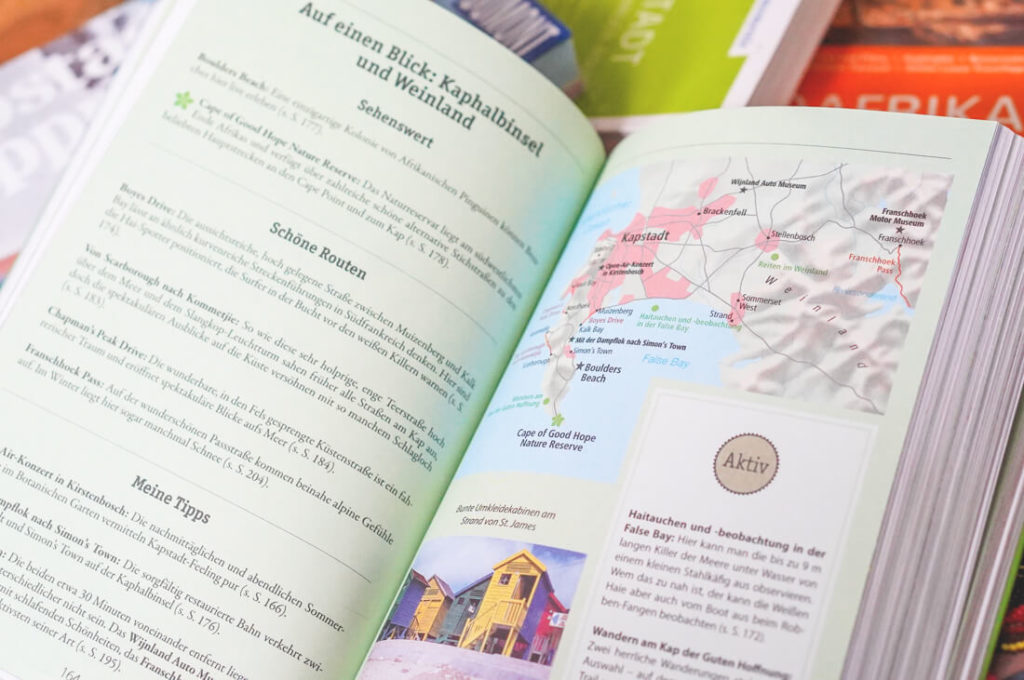
Best time to visit Cape Town
Generally speaking, you can visit Cape Town all year round. The best time to visit Cape Town depends on what you want to experience. For example, if sun, summer, and beach are particularly important to you, then you should choose the months from November to March. It’s warm, dry, and wonderfully pleasant, with temperatures between 20 and 30°C.
Perfect for enjoying the beaches of Camps Bay or Clifton, hiking up Table Mountain, or experiencing the sunsets along Chapman’s Peak Drive. However, this is also the peak season. Many accommodations book up quickly, especially over Christmas and New Year, and the city is very busy. So plan your trip well in advance!
Autumn, from April to May, is a much quieter time in Cape Town. The weather remains pleasantly mild, with temperatures between 15 and 25°C. The landscapes in the popular Winelands are particularly beautiful at this time. Winter, from June to August, is considerably cooler. Sure, it can rain, but there are also sunny days when you’ll almost have the city to yourself. Expect temperatures between 8 and 18°C.
In spring, from September to October, temperatures slowly rise again. Everything is blooming, the air is beautifully fresh, and the days are gradually getting warmer. Now is a great time for hiking or a road trip—and it’s not as crowded as in high season.
Climate chart Cape Town

Time difference
Cape Town is on South Africa Standard Time (SAST), which corresponds to UTC+2 year-round. South Africa does not change its clocks, so the time remains the same throughout the year. During winter time in Germany (end of October to end of March), Cape Town is 1 hour ahead (e.g., 12:00 in Germany = 13:00 in Cape Town).
During summer time (end of March to end of October), there is no time difference – Germany and Cape Town have the same time. The slight or non-existent time difference is a real advantage, as you can start your vacation in Cape Town without jet lag.
Duration of your stay
One of the most frequently asked questions we get is how much time you should plan for Cape Town. The answer, of course, depends on how much you want to see and experience. But we can tell you one thing for sure: Even with 14 days in the Mother City, you definitely won’t get bored!
For a first impression, we recommend at least 4 days. However, if you want to delve deeper and explore the surrounding area, you should plan for 8 to 10 days or more – Cape Town has so much to offer that it’s definitely worth staying a bit longer!
Short Trip to Cape Town (3-4 Days)
If you only have a short time, you can experience the city’s highlights: a hike or cable car ride up Table Mountain, the colorful houses of Bo-Kaap, a stroll along the V&A Waterfront, and a detour to the Cape of Good Hope. This is enough for a compact impression – but you’ll definitely want more.
Cape Town for Explorers (7 Days)
With 7 days, you can explore Cape Town at your own pace. In addition to the classic sights, there’s enough time for beaches like Camps Bay, a road trip along Chapman’s Peak Drive, a day trip to see the penguins at Boulders Beach, and a visit to the Cape Winelands. You can also explore the creative scene in Woodstock or the cool markets.
Cape Town for Connoisseurs (10–14 days)
If you want to experience Cape Town intensively, you should stay longer. 10–14 days are ideal if you want to explore not only the city itself but also the surrounding area. This leaves time for more hikes, relaxing days on the beaches, whale watching (seasonal), or a tour of the beautiful West Coast National Park. You can even plan multi-day trips to regions like the Garden Route.
Entry & Visa for South Africa
Entry into South Africa is actually quite straightforward for German citizens. For tourist stays of up to 90 days, you do not need a visa. Upon entry, you will receive a free residence permit (visitor’s visa). However, your passport must be valid for at least 30 days beyond your departure date. You should also have at least two blank pages free for stamps – this is strictly controlled.
You usually have to fill out a form before entering the country, which you will receive on the plane. There you will state, among other things, your place of stay in South Africa. Upon entry, you may be required to show a return or onward flight ticket, so you should have this handy.
Children require their own passport, which also meets the above requirements. There are strict regulations for entering the country with children. Although the regulations have been relaxed since 2019, it is advisable to carry a birth certificate (in English) as a precaution, especially if only one parent is traveling. More information here: Entry into South Africa.
Health & Vaccinations for Cape Town
Compulsory vaccinations are not required for Cape Town and the surrounding area. However, if you are entering from a yellow fever area, proof of yellow fever vaccination will be required. It is also a good idea to check your standard vaccinations (e.g., tetanus, diphtheria, measles) before your trip.
The tap water in Cape Town is generally safe and drinkable. It meets international standards and is regularly tested. We always brush our teeth with it and also use it to make coffee or tea. If you have a very sensitive stomach, you might want to start with bottled water.
Medical care in Cape Town is very good. The city has private clinics and high-quality doctors. Pharmacies can be found throughout the city, and they are also well-stocked. However, you should definitely have international health insurance so that you’re covered in an emergency and don’t end up with high medical costs.
Book cheap flights to South Africa
So, have you checked the best time to travel, verified your vaccinations and passport, and determined the duration of your trip? Then you should now look for suitable flights. Lufthansa, Condor, and South African Airways offer direct flights from Frankfurt and Munich, but these are often expensive. Direct flights can easily cost €900 to €1200 during peak season.
Flights with stopovers (e.g., in Doha, Abu Dhabi, Dubai, Istanbul) are often cheaper and offer the opportunity to visit another destination. We recommend airlines such as Qatar Airways, Emirates, or Etihad Airways. You can get a round-trip flight to Cape Town with a stopover for under €600 in the off-season (May to September). During peak season (December to March), these flights can be €100 to €300 more expensive.
Use flight portals like Google Flights, Kayak, Skyscanner*, or Momondo to compare prices. Also, set alerts to monitor price changes. Frequent searches also adjust prices. So avoid searching for specific flights too often in a row.
How to save money when booking flights:
- You can often find the best deals 4-6 months before departure.
- Be flexible with your travel dates to find cheap fares.
- Flights on weekdays (Tuesdays, Wednesdays) are usually cheaper than on weekends.
- Cheaper times: May to September (outside of the South African school holidays).
- There are sometimes last-minute bargains.
- Compare prices on different portals.

Airport Transfer in Cape Town
Cape Town International Airport (CPT) is located approximately 20 kilometers from the city center. You have several options for getting from the airport to the city. The most convenient option for many is Uber or Bolt. Both are widely available in Cape Town and significantly cheaper than regular taxis. You can easily book your ride using the app and pay with your stored credit card.
This, of course, assumes that you already have internet access upon arrival in Cape Town. We’ll come to that later. A ride to the city center costs between 250 and 400 ZAR (€12–20), depending on the time of day. Many accommodations and travel agencies also offer private transfers. Depending on the provider, the cost is between 400 and 800 ZAR (€20–40). Book airport pickup and hotel transfer here*.
A regular taxi from Cape Town International Airport (CPT) to the city center costs between 300 and 500 ZAR (approx. €15–25), depending on the provider. The journey takes approximately 20–30 minutes, depending on traffic. Most official taxis do not have a meter, so you should negotiate the price before the journey.
If you want to explore Cape Town and the surrounding area flexibly, renting a car directly from the airport is a good option. Providers such as Avis, Europcar, and Hertz have counters right inside the terminal. Drive carefully, though, as South Africa drives on the left! More on this topic here.
Public transport is not a recommended option. Cape Town doesn’t have a well-developed bus or train network for transfers from the airport, and minibus taxis aren’t really suitable for tourists. We definitely recommend Uber or Bolt, as they offer safe and affordable transport to the city center.
Neighborhoods in Cape Town
Cape Town offers a wide selection of neighborhoods, each with its own charm. Depending on your preferences, you can choose from lively hotspots, quiet beachfront neighborhoods, or creative districts. Here are some of the most popular areas to stay:
City Bowl (Inner City): Close to the city center and ideal if you want to easily reach Cape Town’s highlights such as Long Street, Bo-Kaap, or Company’s Garden. Perfect for those who want to be in the center of the action. In the city center, you’ll find chic boutique hotels, great apartments, and affordable guesthouses.
Camps Bay: For those who love beaches, luxury, and spectacular sunsets. Camps Bay is one of the most exclusive areas of Cape Town, offering stunning views. You’ll find luxury villas, boutique hotels, and expensive vacation apartments there.
V&A Waterfront: One of the most touristy areas, but also one of the most convenient. Ideal if you want to stay centrally while being close to shops, restaurants, and boat tours. You’ll find high-class hotels and modern apartments in this area.
Green Point & Sea Point: A relaxed area between the city center and Camps Bay. Perfect if you prefer a quieter, yet central location. Boutique hotels, B&Bs, and vacation apartments await you.
Hout Bay: Ideal for families and nature lovers who want to stay in a quieter area close to the beach. Hout Bay is outside the city and offers great guesthouses and holiday apartments.
Our tip:
- Beach lovers: Camps Bay or Sea Point (also Bloubergstrand)
- City feel: City Bowl or Green Point.
- Wine and nature lovers: Constantia or Hout Bay.

Hotel tips for Cape Town
Here are our hotel tips for Cape Town, divided into budget, mid-range and luxury:
€ – Budget:
- Ideally Located Garden Cottage*
- Never at Home Cape Town Green Point*
- Sweet Orange Guest House*
- Just Off Long – Inner City Gem*
€€ – Mid-range:
- Urban Elephant 16 On Bree*
- Cape Heritage Hotel*
- DysArt Boutique Hotel*
- Protea Hotel by Marriott Cape Town*
€€€ – Luxury:
- The Silo Hotel*
- One&Only Cape Town*
- Cape Grace Hotel*
- Labotessa Luxury Boutique Hotel*


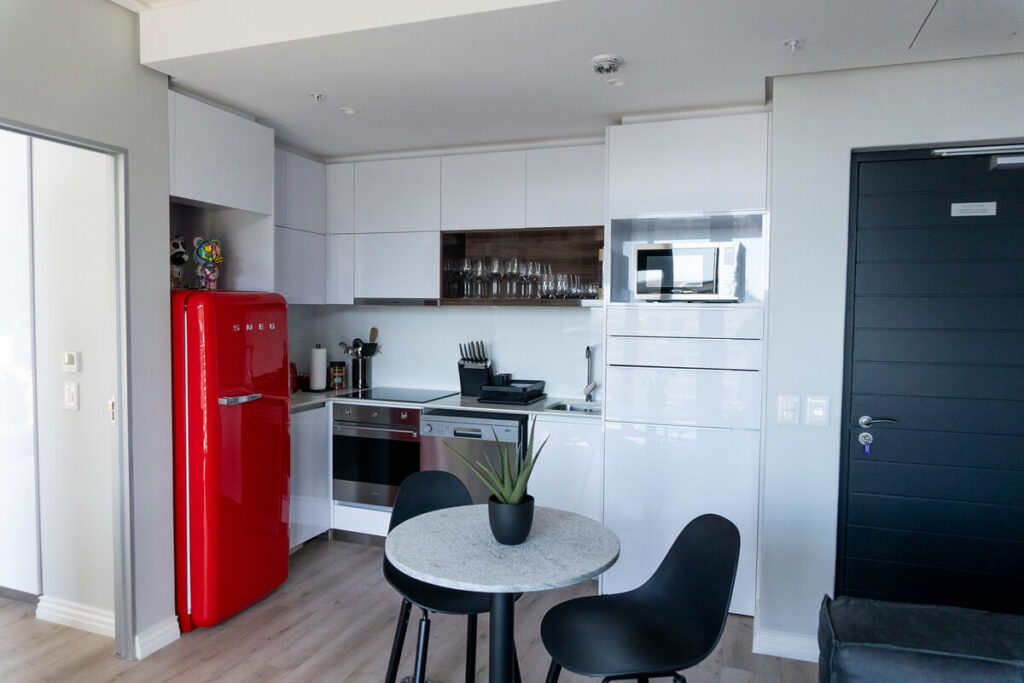
Book a Rental Car
You don’t need a car for the city center itself and can instead travel from A to B in a relaxed manner with an Uber taxi. The MyCiTi buses are also very suitable for covering longer distances within the city. However, if you want to explore Chapman’s Peak Drive, the diverse Cape Peninsula, Bloubergstrand Beach, the Winelands, or, for example, a private game reserve, you are simply better off with a rental car.
We book our car in advance via www.billiger-mietwagen.de*. We recommend this platform not only because we receive a small commission from your booking, but above all because we have been using it ourselves for over 10 years – in 95% of cases. In our opinion, a small car is perfectly sufficient for the city and the surrounding area.
Our experiences with this site have been consistently positive. Of course, you can also compare prices and conditions on other platforms and choose the solution that suits you best. Most recently, we paid only €24.50 per day for a small car for 31 days during peak season (including one-way rental). The longer the rental period, the cheaper the prices often are.
Recommended included services:
- Comprehensive insurance and theft protection with no excess (through reimbursement)
- Glass, tire, and Underbody protection
- Unlimited liability insurance
- All kilometers free
- Fuel policy: full/full
- Deposit should not be too high!
South Africa has many petrol stations, often with refueling and cleaning services (usually windshields). Petrol is also significantly cheaper than in Europe (1 liter of petrol approx. €1.10). Always have some cash ready for tips at the petrol stations. We always tip between 5 and 10 Rand, occasionally 20 Rand.
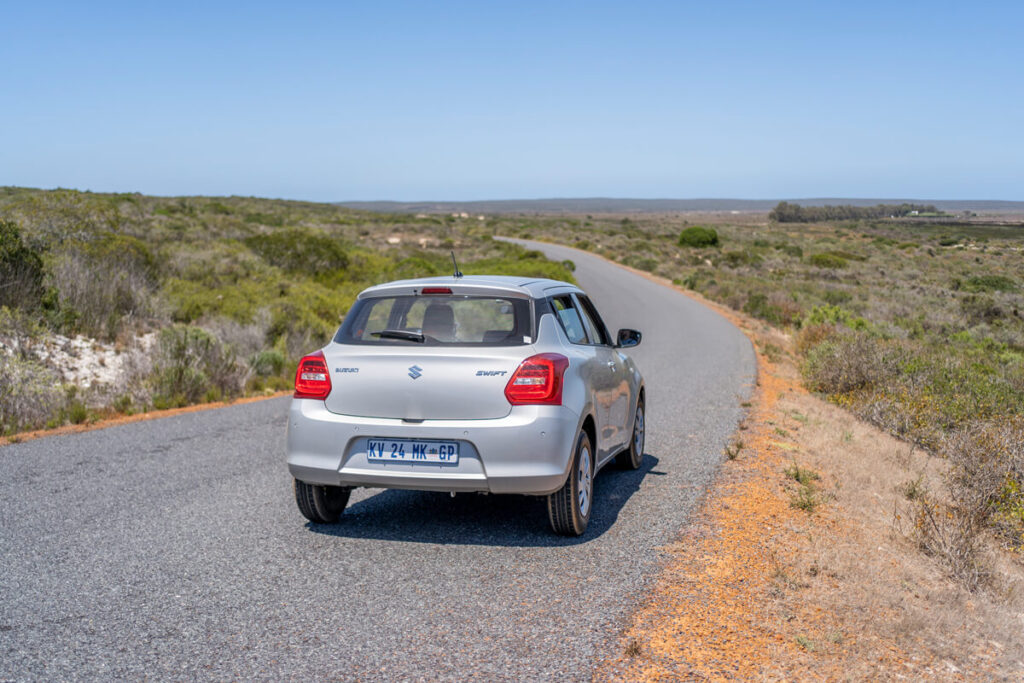
Left-hand traffic
In South Africa, the road is Left-hand traffic. It’s best to drive slowly for the first few kilometers, especially when driving from the airport into the city. The roads in Cape Town and the surrounding area are generally in good condition. However, in rural areas you may also encounter gravel roads – drive carefully and anticipate them. If you enter a roundabout, drive clockwise and remember that vehicles in the roundabout have right of way.
Speed limits:
- In towns: 60 km/h
- Outside towns: 100 km/h
- Motorways: 120 km/h (unless otherwise signposted).
Police checkpoints
The police in South Africa regularly conduct mobile speed cameras, particularly on main roads and motorways. It is therefore important to adhere to the speed limits. Many travelers discover after their vacation that the rental car company has charged their credit card. These are often processing fees because they were caught speeding while driving.
The actual fine is then collected separately by the South African authorities. To avoid this, you should strictly adhere to the traffic laws and be prepared for speed checks. Mobile speed cameras are often located in unexpected places. We have even been caught speeding a few times.
If you are stopped by the police, remain friendly and cooperative. Corruption has become rarer, but if you are offered a “fee” that seems dubious, you should politely decline and insist on an official settlement. The “problem” often resolves itself.
Internet & SIM card
In South Africa, you have several options for making cheap calls and staying online. Due to the high roaming charges of German providers, it’s worth using a local SIM card. The largest providers are Vodacom, MTN, Cell C, and Telkom. They offer prepaid SIM cards with flexible data packages.
- SIM card costs: Between 1 and 5 ZAR (approx. €0.05–0.25) in local shops. You often pay more at airports, sometimes up to 100 ZAR (approx. €5).
- Data packages: Prices vary depending on the provider and package. For example, with Vodacom you get 20 GB for around €12, valid for 30 days.
When purchasing a SIM card, registration under the RICA Act (Regulation of Interception of Communications and Provision of Communication-related Information Act) is mandatory. You’ll need your passport and proof of address for your accommodation, such as a hotel reservation or a letter from your host. The local staff will usually be happy to help you with registration.
If you want to skip the registration process or want to be online immediately after landing, an eSIM is a good option. We’ve had very good experiences with eSIMs so far and can recommend the provider Airalo*. You can find more information here: All about eSIMs for South Africa.
Free Wi-Fi is available in most accommodations, restaurants, and cafés. However, to surf the web securely, you should use a VPN. We use NordVPN* and recommend using it to protect yourself before connecting to public networks. You should generally avoid sensitive transactions when surfing over unsecured connections. More on this here: Data backup while traveling.
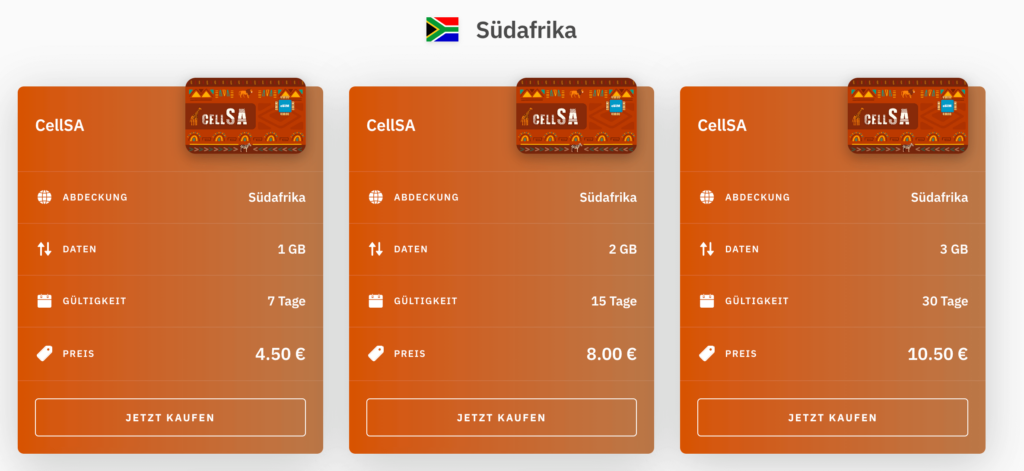
Money & Currency
In South Africa, you pay with the South African Rand (ZAR). The current exchange rate is around 19 Rand for 1 Euro (as of October 2024). You should check the exchange rate again before your trip so that you can better estimate how much Rand you will get for your money when withdrawing money. We usually withdraw €100–150 upon arrival to ensure we have some cash on hand.
Banknotes come in R10, R20, R50, R100, and R200, while coins include 10c, 20c, 50c, R1, R2, and R5. Be sure to carry small change, especially for parking attendants. They help you in and out of parking spaces and keep an eye on your car—a small tip is customary here.
As for payment options, credit cards like Visa and Mastercard are accepted almost everywhere. American Express, on the other hand, is less common. In more rural areas or small shops, you may only be able to pay with cash. With a good travel credit card, you can usually withdraw money for free on site.
An important tip: Always choose to be billed in Rand at the ATM. If you leave the conversion to the ATM, you will often get a poor exchange rate. It’s better to let your bank do the conversion – it saves you money! More on this here: South African currency.
Tips
Tips are simply part of everyday life in South Africa. To be well prepared, you should always have some change with you. Here is a brief overview of what is customary:
- Restaurants: 10–15% of the bill (depending on service).
- Bars: 10% or small amounts per drink.
- Hotel staff: Porters: approx. 10–20 ZAR | Chambermaids: approx. 20–50 ZAR per day.
- Parking attendants/car attendants: 5–10 ZAR if they help with parking.
- Gas station attendants: 5–10 ZAR for services (e.g., window cleaning, refueling).
- Tour guides/safari guides: 10–15% or approximately 50–100 ZAR per person for longer tours.

Loadshedding & Power Adapter
For your trip to Cape Town, you should definitely pack a socket adapter, as common European plugs (Type C/F) are not compatible. Plug types D, M, and N are used in South Africa, with Type M (three-pin, round) being the most common. A simple adapter usually costs only around €2 in local supermarkets. If you prefer to sort it out in advance, you can also order adapters with USB ports online: Order a power adapter for South Africa*.
Another important tip: Find out about the topic of “loadshedding” in good time. These are planned power outages that occur due to supply bottlenecks. These outages typically last 2 to 4 hours and can occur multiple times a day. Good preparation helps you remain flexible during your trip. You can find more information here: Loadshedding South Africa.
Safety in Cape Town
Many readers ask us whether Cape Town is a safe travel destination, as they hear and read a lot and are therefore totally unsettled. Don’t be put off by headlines – with a few simple precautions, you can enjoy your time in the “Mother City” without worry. You can read a detailed article on the topic here: Safety in South Africa – everything you should know.
1. General caution in the city
- Stay in busy areas and avoid walking down dark alleys. The Waterfront, Camps Bay, and other tourist hotspots are generally well-guarded.
- Avoid wearing flashy jewelry or expensive valuables openly. Less attention means less risk.
- We recommend apps like Uber or Bolt to get from A to B safely – especially after dark.
2. Getting around in your car
- Close your car doors and windows when you’re out and about, especially at traffic lights.
- Never leave valuables visible in your car. Take them with you or leave them at the hotel.
- Plan your routes in advance. Some parts of the city, like some areas in the Cape Flats, should be avoided.
3. Outdoor Activities
- Cape Town offers great hikes, but never go alone. Take a guide or join a group, especially on routes like Lion’s Head or Table Mountain.
- Check weather conditions, as they can change quickly in the mountains.
4. Finances and Documents
- Carry only the essentials. Leave valuables in the hotel safe or luggage safe*.
- Only use ATMs in shopping malls or banks.
5. Local Tips and Trust
- Listen to the advice of locals or accommodation staff. They know the city and can give you valuable advice on which places to avoid.
- Trust is good, but a healthy dose of caution is better. Be friendly, but remain vigilant.
Travel Insurance
Your health is your absolute priority – you shouldn’t compromise on this, especially when traveling. Valid international health insurance is an absolute must for trips abroad. Make sure the insurance provides sufficient coverage for medical emergencies, especially for hospital stays and repatriation. You can get such insurance starting at around €25 per year (we use HanseMerkur* ourselves).
Travel cancellation insurance can also be useful. It covers the costs if you have to cancel your trip for important reasons, such as illness or accident. And let’s be honest, something unforeseen can always happen – how sad would it be to be left with the entire cost if the trip falls through? You can find more information on this topic here: The most important travel insurance policies.
Some providers of international health insurance:
- Allianz Travel*
- ADAC
- HanseMerkur*
- World Nomads
- Young Travellers
Cape Town’s Sights
Cape Town is a city full of highlights: Experience breathtaking views from the majestic Table Mountain, explore the colorful houses in Bo-Kaap, and enjoy your time on the beautiful beaches of Camps Bay. The Cape of Good Hope, the lively Victoria & Alfred Waterfront, and the penguins in Simon’s Town are also must-sees. You can find a detailed overview here: The most beautiful sights in Cape Town.
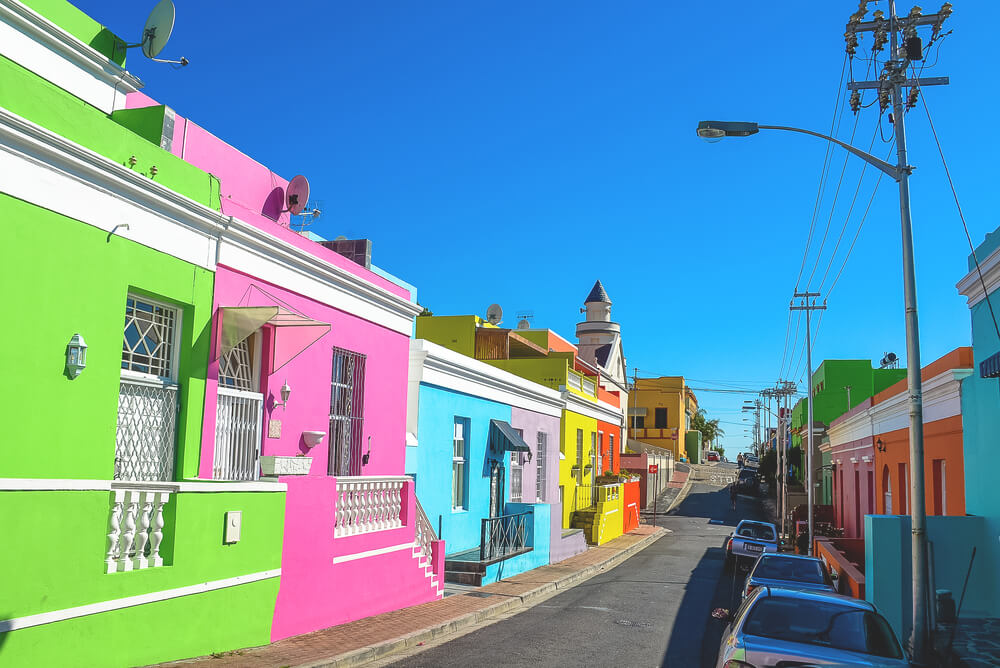
The most beautiful beaches in Cape Town
Cape Town’s beaches are truly in a different league! Whether you love the lively atmosphere in Camps Bay and Clifton Beach, want to discover the idyllic bays of Llandudno, or enjoy a stroll along the expansive beaches in Noordhoek – you’re guaranteed to find your perfect beach here.
Surfers and sun worshippers are also well catered for: While surfing beginners catch their first waves in Muizenberg, a very special experience awaits at Boulder’s Beach – the famous penguins. A detailed overview of the most beautiful beaches can be found in our Cape Town Beach Guide.
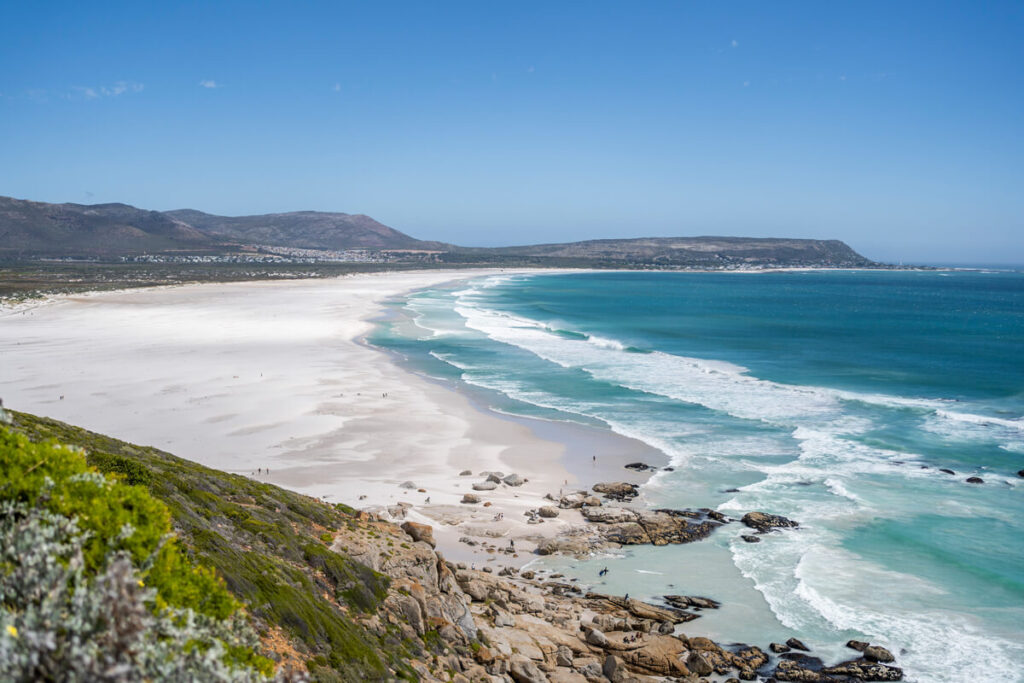
Activities & Excursions in Cape Town
Cape Town offers countless options for activities and excursions: From hiking Table Mountain to a boat trip to Robben Island to a visit to the colorful Bo-Kaap, there’s plenty to experience in the city and surrounding area. A day trip to the Cape of Good Hope or a wine tasting in the Winelands should also be on your list.
You can find more inspiration here:
- Guide to activities in Cape Town
- Great excursions around Cape Town
- Outdoor adventures in and around Cape Town
- Helicopter tour over Cape Town and the coast
- Safari around Cape Town – Sun Experience the Big 5
- The Winelands – 10 wineries that are worth visiting!
- The legendary Garden Route in South Africa

Great Restaurants in Cape Town
There are countless cool cafés and restaurants in Cape Town. You could probably try a new location every day of the year. Cape Town is a true paradise for foodies – there’s something for every taste. You can enjoy a fancy meal or satisfy your hunger with a snack. Here are a few recommended spots:
Truth Coffee (City Bowl): A must-visit for coffee lovers! The steampunk-style location is almost an experience in itself. Coffee and cake taste heavenly!
Kloof Street House: Is a charming restaurant and bar, housed in a magnificent Victorian house at the bottom of Cape Town’s lively Kloof Street.
The Shed CPT: The Shed CPT is known for its delicious Neapolitan pizzas, gourmet burgers, and fresh sushi.
Bodega Ramen: Bodega Ramen is a trendy ramen restaurant in the heart of Cape Town, tucked above the Honest Chocolate Café and Gin Bar on Wale Street.
New York Bagels: We love bagels! New York Bagels is known for its handmade, freshly baked bagels and a variety of delicious toppings.
Yours Truly: This café on Kloof Street is a popular Cape Town hangout, known for its relaxed atmosphere and the lush greenery surrounding the café and bar. Very fancy!
Clay Café in the City: A creative Cape Town hangout that combines ceramic painting with a tapas bar. Here you can create your own ceramic pieces in a relaxed atmosphere while enjoying delicious tapas and drinks.
Hudsons – The Burger Joint (Kloof): A paradise for burger lovers. The restaurant offers a diverse selection of handcrafted burgers and a selection of craft beers and creative milkshakes.
Eastern Food Bazaar: If you’re in a hurry and want to enjoy oriental and Indian dishes at affordable prices, you should visit this spot in the heart of the city.

Cool Markets in Cape Town
There are countless cool markets to explore in Cape Town. The Neighbourgoods Market in Woodstock, which takes place every Saturday, is very popular. Here you’ll find plenty of delicacies, creative stalls, and live music. The Mojo Market (daily) in Sea Point combines food, music, and cool shops, while the Oranjezicht City Farm Market (weekends) at the Waterfront offers fresh, local produce and a relaxed breakfast.
If you’re looking for handicrafts and souvenirs, you’ll find them at the Greenmarket Square (daily) in the heart of the city. Each market has its own charm—it’s best to explore several! The Bay Harbour Market (Fri.-Sun.) in Hout Bay is also really cool. This market is especially popular with locals and offers a mix of street food, handmade products, live music, and a relaxed atmosphere.

Travel Budget & Costs
The price level in Cape Town is relatively affordable compared to many European cities, although the actual costs will, of course, depend heavily on your travel style and preferences. We recently spent a whole week in Cape Town and spent around €467 per person (we didn’t have a rental car in Cape Town). You can find out more about this topic here: Costs of South Africa – This is what a holiday in South Africa costs.
A rough overview of the costs for 3 days in Cape Town (mid-range):
Packing list for South Africa
South Africa is one of the most diverse travel destinations we know – and we’re not just saying that, but after six visits. Whether you’re looking forward to a safari adventure in Kruger National Park, want to explore the spectacular Garden Route, or are looking for the perfect mix of city and nature in Cape Town: With the right packing list, you’ll be well prepared for every situation.
To make packing easier for you, we’ve put together a practical packing list for South Africa based on our experience. Of course, your luggage will always depend on your personal plans and preferences, so this list is intended as inspiration – not as a universal requirement.

Recommended apps & Tools
Want even more South Africa travel tips? We use various apps for our South Africa trips:
- Waze: Great navigation including information on construction sites, police checkpoints, potholes, etc.
- EskomSePush: Shows you exactly when the power will be turned off (load shedding).
- Uber: Quickly and safely call a taxi and pay with it.
- Booking.com: Find and book accommodation on the go.
- WeatherSmart: For current weather forecasts in various regions of South Africa.
- DeepL: Translation of text, speech, and even images.
- Komoot: Very useful for finding hiking trails find and navigate you.
FAQ about Cape Town
When is the best time to visit Cape Town? Is Cape Town safe? Do I need a visa for South Africa? What is the best way to get from the airport to the city? Should I rent a car in Cape Town? What are the must-sees in Cape Town? How much time should I allow for Cape Town? What currency is used in Cape Town?